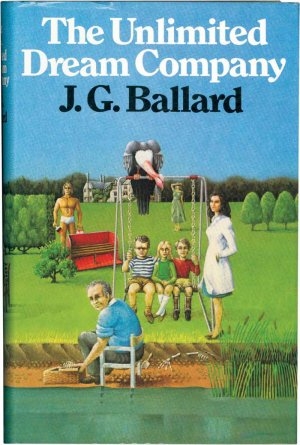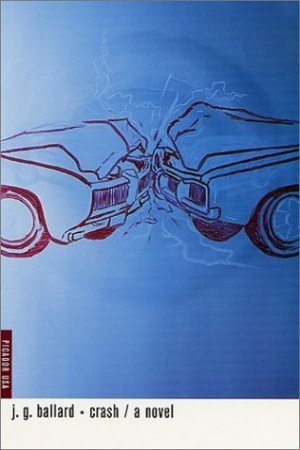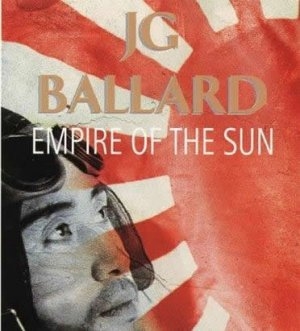
THE GUARDIAN: The novelist JG Ballard, who conjured up a bleak vision of modern life in a series of powerful novels and short stories published over more than 50 years, has died after a long battle with cancer. MORE
THE TIMES ONLINE: Pinteresque, Dickensian, Shakespearean. Not many writers are so distinctive and influential that their name becomes an adjective in its own right. J.G. Ballard, who died yesterday morning after a long battle with cancer at the age of 78, was one of them. “Ballardian” is defined in the Collins English Dictionary as: “adj) 1. of James Graham Ballard (born 1930), the British novelist, or his works (2) resembling or suggestive of the conditions described in Ballard’s novels and stories, esp dystopian modernity, bleak  man-made landscapes and the psychological effects of technological, social or environmental developments.”
man-made landscapes and the psychological effects of technological, social or environmental developments.”
His influence stretched across a modern world that he seemed to see coming years in advance. His dark, often shocking fiction predicted the melting of the ice caps, the rise of Ronald Reagan, terrorism against tourists and the alienation of a society obsessed with new technology. As Martin Amis once said of him: “Ballard is quite unlike anyone else; indeed, he seems to address a different – a disused – part of the reader’s brain.”
The bands Joy Division, Radiohead, The Normal, Klaxons and Buggles all wrote records inspired by Ballard stories. Empire of the Sun, his best known book, was something of an anomaly for being an apparently straightforward account of his childhood in a Japanese internment camp during the Second World War, where he endured near starvation, death marches and regularly bore witness to death and brutality. MORE
NEW YORK TIMES: “I believe in my own obsessions, in the beauty of the car crash, in the peace of the submerged forest, in the excitements of the deserted holiday beach, in the elegance of automobile graveyards, in the mystery of multi-storey car parks, in the poetry of abandoned hotels.” — J.G. Ballard
From his first book, ”The Wind from Nowhere” (1962), to his latest, ”Running Wild” (1988), through such significant titles as ”The Drowned World” (1962), ”The Crystal World” (1966), ”Crash” (1973) and ”High Rise” (1975), Ballard has been depicting the dark underside of civilization, a darkness that seems to increase in the human psyche in inverse proportion to what we call progress. His novels are complex, obsessive, frequently poetic and always disquieting chronicles of nature rebelling against humans, of the survival of barbarism in a world of mechanical efficiency, of entropy, anomie, breakdown, ruin. Yet his focus is always on the human – there are no extraterrestrials in his fiction – and the blasted landscapes that his characters inhabit are both external settings and states of mind.
 Ballard’s writings have been admired in literary circles since the early 1960’s. Kingsley Amis, reviewing ”The Drowned World,” called Ballard ”one of the brightest new stars in postwar fiction” and predicted that he may turn out to be the most imaginative of H.G. Wells’s successors; Graham Greene said that his short story collection, ”The Disaster Area,” was ”one of the best science-fiction books I have ever read.” Susan Sontag has labeled him ”one of the most important, intelligent voices in contemporary fiction.” And Anthony Burgess asserted that ”the first thing to say about J.G. Ballard is not that he is among our finest writers of science fiction but that he is among our finest writers of fiction tout court, period.” Indeed, Ballard’s writings over the years have ranged far beyond the boundaries of genre. Nevertheless, for much of his career his work was confined to the science-fiction ghetto by marketing decisions of publishers, by choice of cover art and by the placement of his books in shops. ”His work is more than science fiction,” says Blake Morrison, literary editor of The London Independent. ”It concerns a fear that all people have about the planet. With ‘Empire of the Sun,’ you could see where his extraordinary fictional world came from. Everything fell into place.”
Ballard’s writings have been admired in literary circles since the early 1960’s. Kingsley Amis, reviewing ”The Drowned World,” called Ballard ”one of the brightest new stars in postwar fiction” and predicted that he may turn out to be the most imaginative of H.G. Wells’s successors; Graham Greene said that his short story collection, ”The Disaster Area,” was ”one of the best science-fiction books I have ever read.” Susan Sontag has labeled him ”one of the most important, intelligent voices in contemporary fiction.” And Anthony Burgess asserted that ”the first thing to say about J.G. Ballard is not that he is among our finest writers of science fiction but that he is among our finest writers of fiction tout court, period.” Indeed, Ballard’s writings over the years have ranged far beyond the boundaries of genre. Nevertheless, for much of his career his work was confined to the science-fiction ghetto by marketing decisions of publishers, by choice of cover art and by the placement of his books in shops. ”His work is more than science fiction,” says Blake Morrison, literary editor of The London Independent. ”It concerns a fear that all people have about the planet. With ‘Empire of the Sun,’ you could see where his extraordinary fictional world came from. Everything fell into place.”
For many general readers, Ballard only appeared on the map of contemporary literature in 1984 with his autobiographical novel ”Empire of the Sun,” the least typical of his books but in many ways the key to his entire body of work. Like Jim, the novel’s hero, Ballard was born and raised in Shanghai, where his father ran a large textile firm. The family enjoyed the luxury of a large, well-staffed house just outside the city’s foreign compound, leading a colonial existence far removed from the turmoil that Shanghai, and China in general, suffered increasingly through the 1930’s: a dizzying succession of governments, street fighting, food shortages, bank failures and, ultimately, invasion by Japan. Like Jim, Ballard was sheltered from this violence and dislocation but observed it all the same, mostly through the windows of the chauffeured automobile that took him to the English Cathedral School and back. It was a childhood of stunning juxtapositions and galloping ironies. His parents held formal balls; Ballard precociously wrote a manual for  playing contract bridge. At the same time, however, he was seeing dead bodies in the streets, hearing shells fired throughout the night, becoming obsessed with the military aircraft that flew overhead. The Sino-Japanese War began in 1937. Ballard and his family managed to retain their genteel standards in spite of the anarchy raging around them until 1942, when Ballard, again like his hero, was sent along with his family to an internment camp for the rest of the war. MORE
playing contract bridge. At the same time, however, he was seeing dead bodies in the streets, hearing shells fired throughout the night, becoming obsessed with the military aircraft that flew overhead. The Sino-Japanese War began in 1937. Ballard and his family managed to retain their genteel standards in spite of the anarchy raging around them until 1942, when Ballard, again like his hero, was sent along with his family to an internment camp for the rest of the war. MORE
THE GUARDIAN: In 1984, Ballard reached a new level of public recognition with Empire of the Sun, a straightforwardly realist novelisation of his detention as a teenager in a Japanese camp for civilians in Shanghai. It had taken him 40 years to prepare himself to tackle this formative period of his life – “20 years to forget, and then 20 years to remember,” as he later put it. The novel follows a young English boy who, like many of Ballard’s narrators, shares the author’s name, during the Japanese occupation of Shanghai. Separated from his parents, Jim at first survives on abandoned packets of food in the deserted mansions of the international settlement, before being picked up by the Japanese and interned in the Lunghua Civilian Assembly Centre, where he relishes his unaccustomed freedom amid hunger, disease and death. MORE
